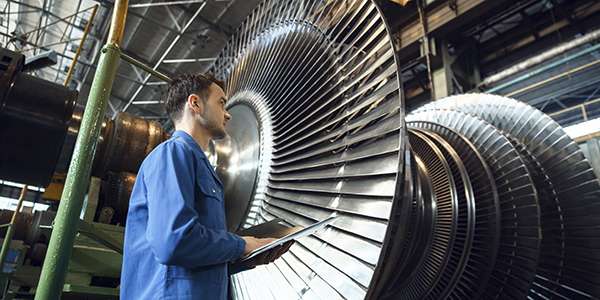Pall offers the filters you need for efficient steam turbine management, Oil quality, cleanliness and low moisture is critical for steam turbine lubrication systems, seal oil and EHC (Electro hydraulic Controls)
- Optimum oil filtration with Athalon Filters for new and Pall Supralon replacement filters for existing applications offering longer service life, resistance to stress, reduction in ESD and potential for the formation of varnish (oil degradation), resulting in cleaner oil.
- Monitoring and testing of oil characteristics – Fluid Cleanliness Monitors, Remaining Life indicators, Water Sensors
- Total control with water removal products for turbine lube oil – HNP/HDP purifiers, Varnish Remediation Units
Turbine Area Management Applications
-
Turbine bearing lube oil system
-
Turbine lube oil flush
-
Hydrogen Seal oil
Prevent bearing wipes at start-up
The particles that do the most damage are those the same size as or slightly larger than the dynamic film thickness separating component surfaces. Most system components have operating clearances less than 5µm. Normal operation, journal bearings typically have 20µm dynamic clearances. At turning gear speeds, however, these film clearances can be as small as 1.5µm! These smaller clearances are also found when bringing the turbine up to full load or coasting down. Thus, it is essential to remove particles in the 1-5µm range to protect journal bearings from abrasive wear and minimize the chance of bearing wipe.
Combat abrasive wear during turbine operation
An initial flush is no guarantee that contamination will be held in check during normal system operation. This is due to the "chain reaction" of abrasive wear, the primary wear mechanism associated with turbine lube and hydraulic systems.
Particles enter the clearance between two moving sur faces, bury themselves in one surface, and act as cutting tools to remove mate rial from the opposing surface. Generated debris, if not removed by proper filtration, will recirculate in the system to cause additional wear. As this "chain reaction" of abrasive wear continues, it will result in premature component failure unless adequate filtration is applied to arrest its progress.
Install clearance protection filtration to ensure long life & high reliability
For small and medium steam turbines, as well as for gas turbines, Pall filters are installed in-line for maximum protection of critical bearing systems.
Permanent recirculating loop (off-line) Beta 2000 rated filters are currently installed on many large steam turbine reservoirs for continuous protection against clearance size particles. Pall filters achieve consistently lower contamination levels compared to traditional oil purification systems that use inefficient mesh screens, bag filters, 10µm nominal cartridge filters and centrifuges. The result is more reliable lift pump operation, reduced abrasion of babbitt and journal surfaces, and fewer bearing wipes.
Control water contamination
It is generally recommended that turbine lube oils be maintained with purifiers, typically installed in an off-line / kidney loop configuration, which have the ability to remove both free and dissolved water. Studies have verified that free water reduces bearing life, increases oil oxidation, and can contribute to sludge in the oil.
Pall offer a range of oil and varnish removal oil purifiers that can remove remove 100% of free water 80% of dissolved water, they also remove 100% of free and entrained gases and up to 80% of dissolved gases.
Shorten duration of flush to maximize turbine availability
A primary concern of every power generating facility manager is the duration of an outage.The time it takes to return a turbine to operation can result in tens of thousands of dollars in lost revenues. It is critical, therefore, that flushing of the turbine lube system be completed as quickly as possible.
Pall filter assemblies, which can be manufactured to both ASME-coded and non-coded specifications, have been used by major utilities with excellent results.
Protect the seals from abrasive wear and prevent water ingression into the generator, maintain seal integrity, protect hydrogen purity, and minimize maintenance of the sealing system.
To minimize resistance to rotation, or drag of rotor, hydrogen gas is used to fill the generator shell. To maintain hydrogen gas purity, minimize leakage and maintain maximum generating capacity, an oil seal consisting of seal rings and pressured oil fields is utilized. This oil film reduces mechanical wear of the seal rings and turbine shaft and ensures positive sealing.
Contaminated oil (fed from main lube oil tank) will wear the gland seals and abrade the turbine/generator shaft. This can lead to premature rework or replacement of gland seals, hydrogen leakage, higher windage losses in generator (reducing overall efficiency) and the possibility of outage. For these reasons high efficiency, low pressure drop duplex filtration is essential for optimum hydrogen seal performance.









